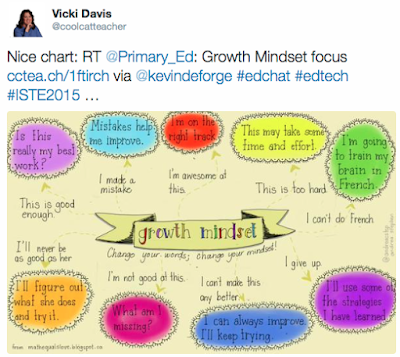I have had a Twitter account for a pretty long time. I first set up an account for myself in early 2011 when Twitter was being described in the media as the “next big thing” in tech. But at that point, I really didn’t see anything useful about it. As a result, for several years my Twitter account sat dormant in cyberspace.
I resisted Twitter for a long time because it appeared to me to be the most narcissistic of the social media tools – something used by celebrities to tell us what they ate for breakfast. And, in many instances, Twitter (like Facebook or Instagram for that matter) is used for such shallow purposes.
 |
| #narcissism |
But a couple years after creating my account, something happened which changed my perception of Twitter. I was encouraged by a cool summer tech class and a great teacher, Jon Smith (@theipodteacher), to give it another try. Reluctantly and skeptically, I did. What I soon discovered was that if you knew where to look, there was a vibrant and thriving community of educators sharing great teaching ideas on Twitter.
 |
| One of my first tweets in Jon’s class |
If you are an educator, Twitter can be an awesome resource for innovative teaching ideas as well as a great way to connect with the movers and the shakers in teaching profession all over the world. On Twitter, educators commonly refer to their PLN or Personal Learning Network. Your PLN on Twitter is like being in the teachers lounge with all of the best and brightest in our field. I can safely say that I have learned more from my Twitter PLN in the past year than I have in all my years of professional development provided by my school.
 |
| Some tweets inspire while others share great resources |
So, if you are a Twitter newbie, here are my 5 tips on getting started…
Tip #1 Follow the Best of the Best
In my opinion, the problem most people have with social media like Twitter is that they follow/friend/pin indiscriminately and then feel overwhelmed with keeping up with it all. I have heard Twitter described as being like drinking from a fire hose. That is an apt metaphor. My recommendation is to ease into it by following just a few great individuals. Ask others who their favorite “follows” are. Have a great book on teaching you love? Follow the author. Have a great teaching tool you use? Follow that company to get updates on their latest innovations. Over time, these “follows” will likely lead to other people or companies you will be interested in following as well.
| Need ideas for people to follow? Try this article for starters. |
Tip #2 “lurk” casually for a bit until you get the hang of it
Use your early days to “lurk”, that is, just read comments and posts in your Twitter stream. This will familiarize you with the lingo of Twitter and some of the methods that people use to connect with others such as tagging someone using their Twitter handle. One of the things I had to get over using Twitter in my first year was feeling as if I needed to read/look at everything in my feed as you might with e-mail or maybe Facebook. Depending how active the people you follow are on Twitter, this can become impossible unless you are checking it constantly. Obviously, this becomes a drain on your time and is ultimately unproductive. When you get busy you’re going to miss some tweets and that’s okay. Learn to live with that fact.
Tip #3 Follow Educational Hashtags
Hashtags have become a fad cultural phenomenon of sorts – a way of being clever or adding a hint of sarcasm to a comment (ex. #firstworldproblems). However, the real purpose for a hashtag (# symbol) is to use a phrase to filter out comments in your Twitter stream. Using the firehose analogy again, a hashtag allows you to siphon off a small stream of comments. Many educators use this to have Twitter chats of various kinds. One of my favorite hashtags is #4thchat, where other 4th grade teachers like myself get together once a week to discuss various topics. For more on the history and uses of hashtags, check out this great blogpost on the topic.
Check out this link for some great Educational Twitter Hastags to follow.
Tip #4 Time to stop lurking and interact with others!
Ultimately, Twitter is a conversation! You can’t just observe forever. However, if you are not afraid to put yourself out there a little bit, you can communicate directly with educational superstars all over the world. And, the coolest part is that unlike most movie stars and famous athletes, they usually respond back. I’m pretty sure if I tweeted to Lebron James, he’s probably not going to care enough to answer my tweet, but I have had small Twitter mentions and conversations with some big names in education today like Dave Burgess (@burgessdave) and Paul Solarz (@PaulSolarz) as well as great innovative companies like Kahoot (@getKahoot), and Class Dojo (@ClassDojo). This really helps you feel as if you are in a larger community of people who are all striving to be better educational leaders.
 |
| I confess to feeling a little giddy when Teach Like a Pirate author Dave Burgess “favorited” two of my tweets |
 |
| @GetKahoot contacted me on Twitter after I blogged a technique for making Kahoots more awesome |
 |
| I tweeted about how much I loved the book Learn Like a Pirate and author Paul Solarz was appreciative! |
Thanks to Teaching Trio for the cool Technology Thursday link up – its my favorite!





